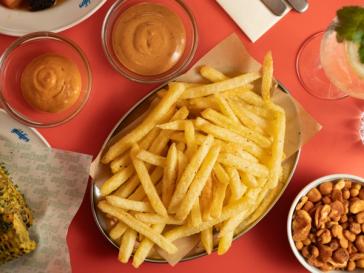
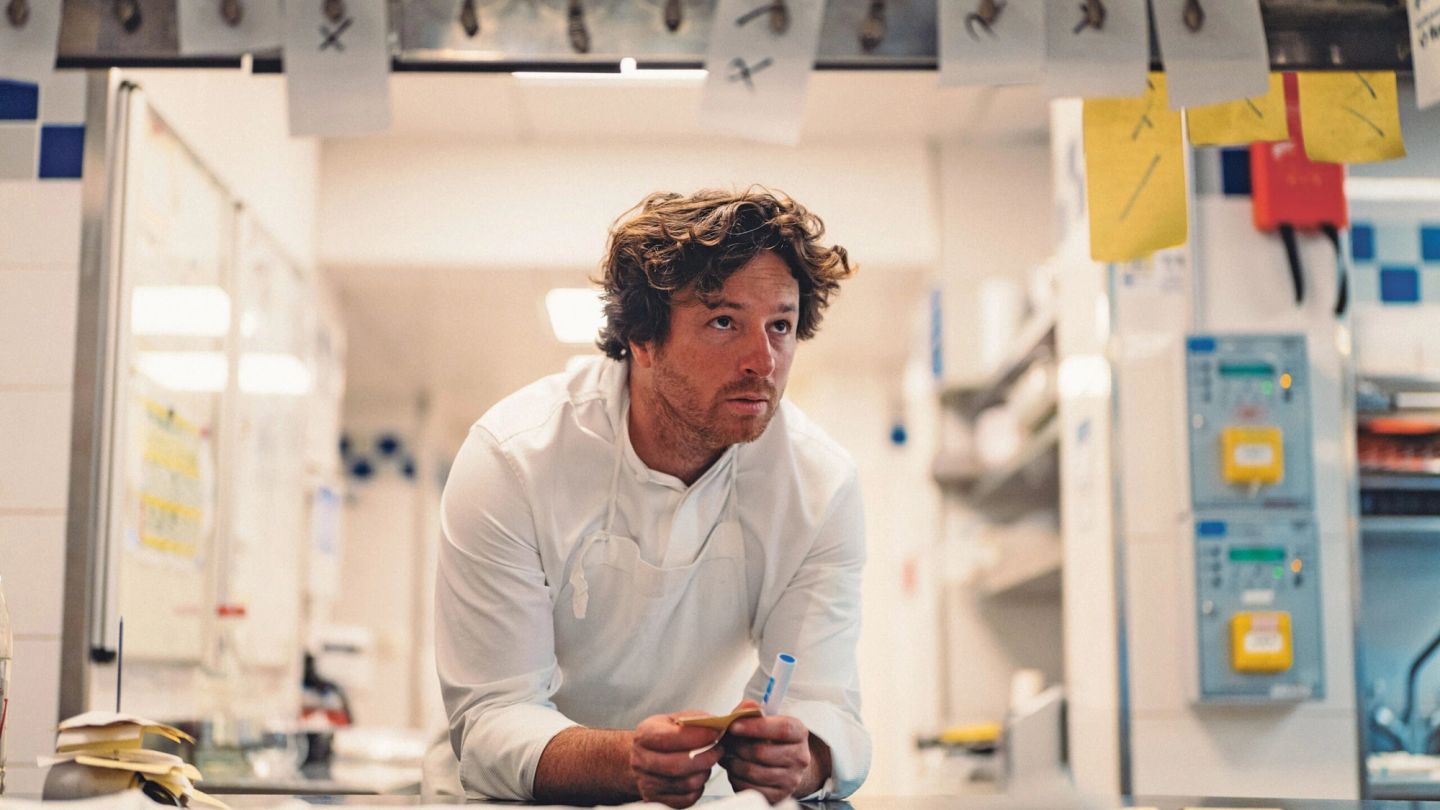
Words: Joseph Bullmore
Is it wrong to think of Jean Imbert as some sort of culinary Samson? To imagine that his power and glory somehow lies in that dramatic, beautiful, ever-buoyant sweep of chestnut hair? The mane is so emblematic of the man, somehow — a thought I have had many times before as a devoted scroller (along with 477,000 others) of Imbert’s colourful, lovable Instagram account. So Gallic, so certain, so unfussy, so deep and rich. Patisserie hair. Bourgougnon locks. Can a bouffant shrug?
Often, when you’re interviewing time-poor people (and I catch Chef Imbert in the calm before the storm of a lunch service at Plaza Athénée) you keep a final question in your back pocket for the inevitable moment when the PR says: Just one more, Joe, if that’s okay. So having done the food and the fame — Chef Imbert, you’ll remember, won Top Chef in 2012, was named one of the most important people in France by Vanity Fair in 2019, and now runs the kitchen at Plaza Athénée in Paris, one of the most prestigious in the world — I went for the follicles. And Jean’s Imbert’s answer told me instantly that I had been looking in the wrong place.
“I wish I had a secret for you,” he laughs. “I just need to thank my parents, I guess…” Aha! Like all good food stories, the truth lies not on the surface but in the depths. This is a tale of provenance, not presentation. Imbert’s love for cooking, he tells me, stems from the childhood restaurants he put on with his brother at the age of eight in his parents’ living room.
Even further back than that, it comes from his grandmother, who cooked for him on Sunday afternoons in the southern suburbs of Paris where he grew up — times he said were the “best moments of my life”. (Rather beautifully, Imbert opened a restaurant in partnership with his grandmother Nicole in 2019, named simply ‘Mamie’.)
By the age of ten, Imbert was regularly attempting the most complicated and quintessentially-French dishes in the cookbooks of Michelin-studded chefs — Michel Guérard, Alain Ducasse, Joël Robuchon. From there, he says, “it felt like a very long time, waiting eight years, to be 18 and be in a real job cooking…”
There is another element of his youth, too, that seems to have informed completely Imbert’s later success. “I grew up with Michael Jordan,” he says. “I was crazy about him. Like nobody else — crazy.” What he admired most was the basketball player’s dedication and drive, and the ultra competitiveness that somehow made him more than the sum of his talents.
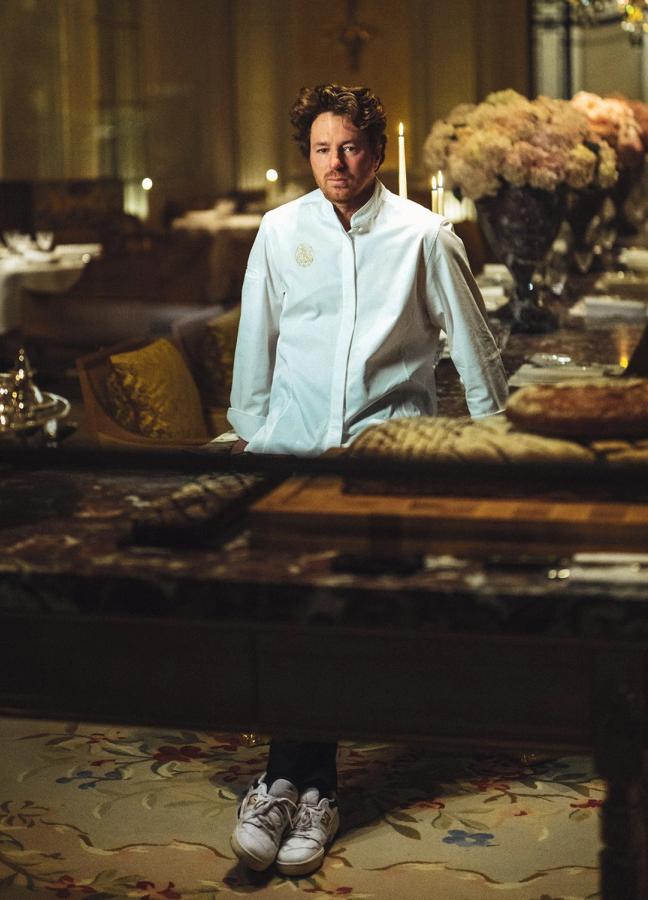
When Imbert was young, he tells me, his father wouldn’t want them to sit at the table if they had lost at football or at tennis, while his proximity to his brothers made him a natural scrapper from an early age. This is almost certainly how Imbert opened his own acclaimed restaurant — l’Acajou, in Paris — at the tender age of 22, and how he won Season Three of Top Chef in 2012 at the age of 31 (the French equivalent of Master Chef — only even more prestigious in a nation where food is art, sport, politics and love all at once.)
It is that same, perma-youthful perspective, too, that led many in the boorish French culinary establishment to sniff at Imbert as a sort of “enfant terrible” — an upstart, an outsider — when he was named the success to the feted Alain Ducasse at the Plaza Athénée last year. And it is the same energy that has made him succeed so spectacularly in that kitchen from the off. Here, just before lunch, Chef Jean Imbert talks Pharrell Williams, Peter Pan, and playing the underdog.
JB: I want to start with a quote of yours which I read this week. “We sometimes lose our childlike sense of imagination as we get older. At the end of the day, I’m just a young boy trying to hold on to his fairy tales.” How do you keep doing that? And is it getting harder?
JI: I think you become old when you ask yourself if you’re still young. I never think about it. I’m just on the move. Maybe I am like Peter Pan — I will never be old. Even when I put on the Plaza Athénée chefs whites, it feels weird for me. If I think about it, it’s too big.
But when I am in the kitchen, I really feel I am in my place. Even in the kitchen, I love to have fun, make jokes with my team. I consider most of the team my friends. It’s a different way to see thing. For me it’s not a job. Food and cooking is still the same hobby as when I was 12 years old. It’s like I am 12 and cooking for my family.
“Maybe I am like Peter Pan — I will never be old…”
Even at eight, I wanted to be a chef. I don’t like the name chef, but I wanted to cook. When I was 10, I was in my parents living room, and I created a small restaurant, with my brother serving dishes. And then it felt like a very long time, waiting eight years, to be 18 and be in a real job cooking.
I liked very complicated French dishes back then. I made a lot of mistakes. I loved Michel Guérard’s cookbook, Alain Ducasse, Joël Robuchon. I would take the books, cook the dishes, and mess up, and mess up, and sometimes I made something good. But I was very concerned about where the produce came from. I was asking myself where the tomatoes came from, where the fish came from.
You are sometimes called the ‘Enfant Terrible’ of French cooking. How do you feel about that label?
Enfant? Okay. Terrible? I don’t know. I think I sometimes break the code. But it’s not posturing. I am how I am. If other people think I’m an enfant terrible? Okay. But I don’t just want to be different [for the sake of it]. It’s not posturing.
You were named the new chef of the Plaza Athénée in 2021. Do you feel like you’ve made it? That you’re part of the establishment?
I hope I never feel that I’ve made it. If I feel that, it’s done. I like to be an outsider. I like the feeling where no-one expects you to score or to win. I think it’s because I played a lot of sport when I was younger. If we lost at tennis or soccer my father wouldn’t want us to sit at the table. It was very competitive, a very American way to be. I think I also won Top Chef because of that. It’s beautiful to be an outsider in life. When I was chosen to run the Plaza Athénée, it was of course an outsider choice.
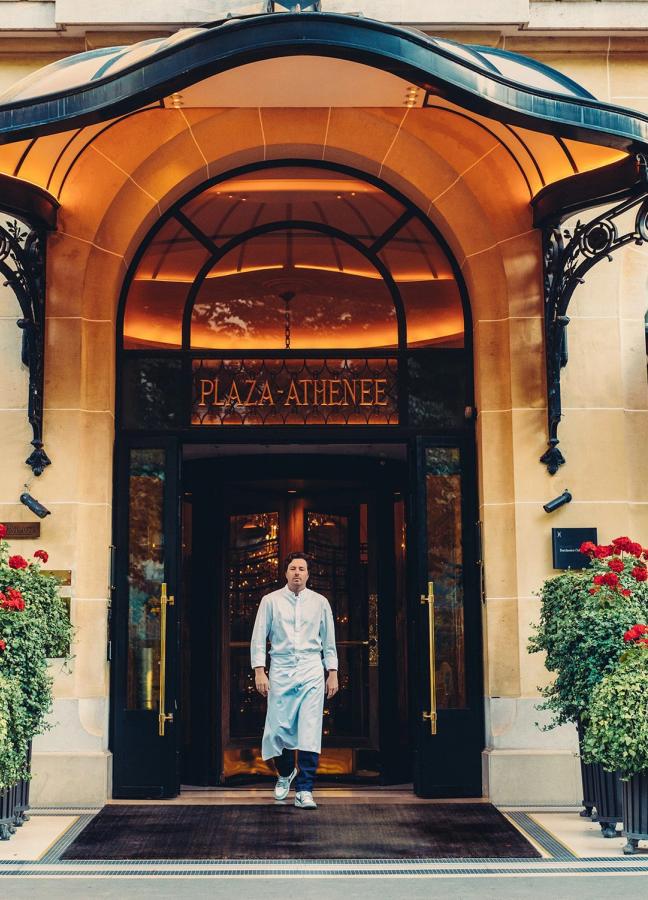
What have been the best bits so far?
We opened this restaurant on the 4th of December with 28 people in the team, and today it’s the 26th of October and we have that same 28 people. This is what I’m most proud of . We know how complicated it is to find good people to work in the kitchen. To have created this team, and they are still like brothers — this is what makes me the most proud.
You opened your first restaurant in Paris just over 20 years ago. Has Paris changed in the past two decades?
Yes and no. Twenty years ago we had plenty of three Michelin star restaurants. I love to go to restaurants. I am a chef who loves to eat from other chefs, even alone. In my mind, I don’t know another city where we have this diversity of food. If a friend visits from Japan or the UK and asks me where I should eat, I have 50 places I can recommend.
It is an interesting time, culturally, to be a chef. There is a big new US show The Bear, which claims to show the trade in a truly honest light; there was Boiling Point, an incredibly intense drama about kitchen life; and now The Menu, which has Ralph Fiennes as a sort of fanatically murderous chef. Have you seen any of these shows and films? And why do you think we have such a fascination with your profession?
I think it’s because in a kitchen the feelings are very strong. They are bigger than they are in real life. If you are sad in a kitchen you’re very sad. If you’re happy you are very happy. If you want friends, it’s very friendly. If you want to fight, it can be very big. It’s like the adrenaline is so high. For me, cooking is like a soccer game. You have 90 minutes, and you never know how it’s going to finish. And it’s a team sport. We have to deliver something. And at those moments everything is bigger and faster than normal life.
Do you still play a lot of sport?
I still play soccer in a league, and I play tennis and basketball every week. I love competition. I want to beat my one brother in basketball, my other brother in tennis. I want to continue scoring. I’m the number 9 in football, so I have to keep scoring.
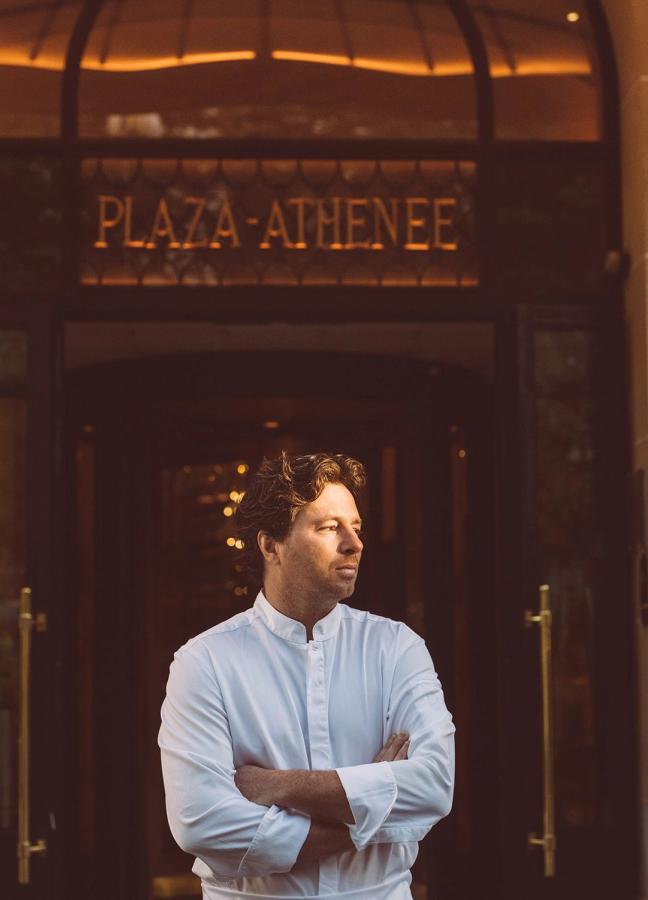
I grew up with Michael Jordan, watching him on TV in 1991, 1992, 1993. I even went to Chicago to watch some games live. I was crazy about him. Like nobody else — crazy. I can show you something, actually — look. One of the only things I have in my office is the last on-court shot of Michael Jordan, but signed by him. I always say that if one time I cook personally for Michael Jordan, I’ll stop my career. I hope that doesn’t happen soon, but I hope I do get to do it, because he was my idol when I was young.
Everybody thought Jordan was winning all the time, looking back now. But people forget that he lost for a long time — for seven, eight years. But his process of mind was that he was going to make it, no matter what. This feeling helped me a lot when I was young, because I think losing is part of the process. We never speak about this a lot when in France, because it’s not in the DNA of our culture. But I like to think the reason I am at Plaza Athénée now is because I lose, and I understand that I have to lose to be better. I love that.
What have been the toughest moments — or biggest losses — in your career?
When I was 22 , I opened a restaurant alone, and that’s very difficult. Some months were very hard. Then when we shot Top Chef, I went three months out of the restaurant and it was very complicated. I often asked myself whether I would make something in the chef’s life. But I think either you have something in you, or you don’t have it. You need to believe a little bit in yourself. You have to see that you can win when everybody thinks you are going to lose.
“In a kitchen the feelings are very strong — bigger than in real life…”
Do you think cooking is an art?
I don’t think cooking is an artform. We are artisans, not artists. We make something with our hands. A good chef is good with his head but also with his hands. It’s like two jobs. You have to be a good technician, but creativity is not in your hands, it’s in your brain.
You have collaborated with Pharrell Williams on several restaurants — on St Barths, in Miami, in St Tropez. What have you learned from him?
I have had a chance to be with Pharrell in the studio at some moments in Miami or Los Angeles. I remember the first time I was there, his assistant told me: be careful when you enter because since this morning he has been in the zone. I understand what that means. He was possessed — creating new music with another artist. They were singing together, and they were just in the zone. I understand that, because sometimes in my cooking life I have an hour on the plane and I have an idea, and I write out everything, draw everything — and I have a feeling that I am creating something. I love to see artists in the zone like that. I once saw Jay-Z and Beyonce creating music on their tour, and I cooked a bit for them during the rehearsals. To see them creating as artists at that level, it was beautiful — it gave me a lot of energy.
Food often reflects the times. What do you think people want from food in 2022?
I don’t know. I think people need comfort. If you ask me, I think comfort is first. If I think of Plaza Athénée, the food I do there, I think the overwhelming feeling [that I want to create] is that you are good, you are well, you are with your friends — and that when you leave there, you leave a part of historic Paris happy.
Sometimes, when you are an entertainer, which we are, it’s a difficult position, and we have to be very humble. We are not blind to what is happening to people everywhere, everyday. So of course, most of all, we want to just make people happy.
This article was taken from the Winter 2022 issue of Gentleman’s Journal. Take a look inside the latest magazine here…
Become a Gentleman’s Journal member. Find out more here.


